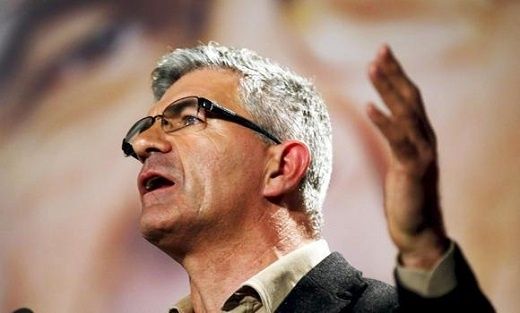With Sunday’s presidential elections, Portugal finds itself in a precarious position. The two-month-old government alliance of socialists, communists and radical ecological party The Greens faces ruling alongside a conservative head of state.
OPINION: Continuity over Change: Portugal Ahead of the Elections
Portugal’s president is not just a ceremonial role: six months after taking office the chief can dissolve parliament and call new elections if they believe there are threats to the “normal operation” of democracy.
They can also challenge government bills and call for reviews in parliament, which could potentially sabotage the new leaders’ anti-austerity programs.
Here’s who’s still in the race for the keys to Portugal’s pink presidential palace:
Marcelo Rebelo de Sousa

Photo: Nuno Veiga / LUSA
The far-and-away favorite is TV political pundit Marcelo Rebelo de Sousa. Known as “El Profesor”, the conservative former law lecturer started with a P.R. leg-up over his nine rivals: Unlike the other candidates, Revelo de Sousa is known, and liked, across the country. He even announced his candidacy on his TV show.
He’s currently polling at over 50 percent (which if translated to the election would prevent a run-off) and one right-wing poll suggest that 22 percent of communist voters prefer him to their own candidate. He’s even got “chosen one” Jose Mourinho’s vote.
Rebelo de Sousa presents himself as moderate, but the former Social Democratic Party leader could spell bad news for the left government. He has been shady about what kind of relations he might hold with them. Despite saying that he is "against having general elections every six months,” he hasn’t ruled out the idea of dismissing the government.
“In my interpretation of the constitution, the dissolution of parliament is justified if there is a serious crisis in the smooth functioning of the institutions: the government with parliament, the government with the courts, within the government or the government with the president,” he has said.
Maria de Belem

Photo: AFP
Maria de Belem, former president of the Socialist Party, former health minister, and minister for equality, does not have the support of the Socialist Party for her candidacy. This might have something do with a strained relationship with Prime Minister Antonio Costa. She is viewed as lightweight and a watered-down socialist and is polling at around 16 percent.
Antonio de Sampaio da Novoa

Photo: AFP
More or less neck-and-neck with de Belem is independent Antonio de Sampaio da Novoa. This is the former dean of the University of Lisbon’s first foray into politics and he’s not a member of any party, but is supported by former presidents Ramalho Eanes, Mario Soares and Jorge Sampaio.
OPINION: In Solidarity with Greece
If lack of experience were his downfall, his meager charisma could be the nail in the coffin.
Hanging to the left of center, Sampaio da Novoa vows to bring about “change in Portugal and contribute to change in Europe.”
Edgar Silva

Photo: Reuters
If the election looked to be a snore-fest over the likely Rebelo de Sousa shoo-in, Edgar Silva is the one candidate to add some intrigue.
Backed by the Portuguese Communist Party, Silva gave up priesthood in 1997 to take up communism and has been a stalwart protester against child poverty and sexual exploitation.
Father Edgar is a hard-line communist. He’s for pulling Portugal out of “unconstitutional” NATO and wants to finish with Portugal’s “submission and subordination” to the exterior.
He told Portuguese press that he wants to “wake up the sleeping majority.” It’s unlikely he’ll get the chance to though, with polls suggesting he might take five percent of the vote.
Marisa Matias

Photo: Facebook / Marisa Matias
At 39, Marisa Matias is campaigning to be Portugal’s youngest and only female head of state for the Left Bloc, though with opinion polls giving her less than Silva this is improbable.
“We need a new generation in politics to inject fresh life into our institutions,” the sociologist, with work in the area of environment and public health, told reporters. Matias is European MEP of the European United Left–Nordic Green Left, supported by the Left Bloc.